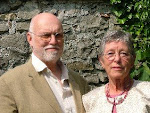From time to time - I should probably do this more often to improve my language skills - I translate articles in French media. Here's one from this week.
Translation of article in Midi Libre 13/8/25 - interview with Stéphanie Latte Abdallah, historian and anthropologist, by Arnaud Boucomont Now living in the Cevennes, previously in Jerusalem, she has a harsh view of the strategy pursued in Gaza by the Netenyahu government, which requires an active response.
Do you think total occupation of Gaza by the Israeli army is feasible?
That would be complicated, although it has long been its public aim, staying in and recolonising Gaza. We've heard that for ages; the commander-in-chief of the army has said that clearly to politicians but the message has not been heard. It would take a huge number of men in the longer term, and the army is relatively fatigued with many reservists refusing to serve there. The Israeli army is faced by an ongoing guerilla war by Hamas. Gaza is pretty well destroyed but Hamas' capacity to act is not completely exhausted.
What's your view of the attitude of the international community, France in particular, over the past two years?
The recognition of the Palestinian state is long overdue, but there is an interest in isolating the current Israeli government over its refusal to recognise a Palestinian state. If Britain joins France as it has promised then the USA will be the only state in the UN Security Council not to recognise it. In the proposals publicised so farthere are no means of enforcing the proposals. There should be sanctions, and suspension of the accord of co-operation between the EU and Israel. But that would be to act without acknowledging the current genocide, without naming it as such. Because if it were named the countries involved could be even seen as complicit in the genocide because of their inaction.
What about the growing famine in Gaza?
There will be severe consequences for children, older people and those with chronic illnesses. In the long term I call that 'futuricide', resulting in killing as many people as possible. More than 61,000 have died directly as a result, but the lack of healthcare, chronic sickness, famine, land poisoned by armaments, pollution, lack of refuse collection and of cleaning services brings the total up to around 200,000 people.
How would you sum up the policy of Netenyahu over the past two years?
He was always against a Palestinian state. There is a fragile coalition between supremacist and pro-colonisation ministers and deputies and those in favour of annexation of the West Bank and the re-colonisation of Gaza. They claim to be following the biblical principles. Netenyahu himself is not especially religious but uses this language to build up support for his project. He has stayed in power by enlisting the most extremist members of his government who guarantee his position. He hopes to keep tension up by occupying as much territory as possible. He tries to avoid political scrutiny.
How do you view the religious aspects of the conflict?
On the Israeli side we can see the co-option of a religious-sounding language through the idea of a battle with Amalek, the old testament enemy of Israel, each side trying to destroy the other. In the Bible it was seen as necessary to destroy Amalek completely. In a March 2025 study by Penn State University, 82% of Israelis were in favour of moving all Palestinians out of Gaza.
In the other camp, obviously there are the islamist groups like Hamas and jihadists who fight in Gaza using islamist language. There are also other groups which are mainly secular. Within the Palestinian population religious motives are not so much to the fore.
The typical Palestinian who finds her/himself being bombed, losing children, how can that do other than generate hate or antisemitism?
Speculating on such emotions takes us beyond the realm of rational analysis But Palestinians distinguish clearly between Israeli policy and jews. the question of antisemitism as seen from France does not arise in the same way in Israel or Palestine.
So how do you see this conflict being played out in France?
Generally we've seen a gradual change in public perception over the past two years. People were quite virulent in their views to start with, not wanting to see what was actually happening, that the Israeli government really wanted to destroy Gaza, but things are changing. Better late than never. For France, which has long supported the State of Israel, it's complicated. It is difficult to tell yourself that Israeli governments are committing genocide when that very state grew out of genocide suffered by Jewish people.
What about the strategy of Hamas?
At the time of the 7 October outrage Hamas' objective was to make sure Palestine was not forgotten in the signing of the Accords of Abraham which foresaw making peace without taking account of the Palestinian question. They also wanted to avoid the annexation of the West Bank and demonstrations in front of mosques.
They could have reacted differently!
From what they've said, some things got away from them. They do not accept that they intended to target civilians. They claimed that other groups had infiltrated theirs. But there were certainly abuses and war crimes by several groups, of course including Hamas.
All the same, the strategy involved murders and taking hostages…
Hostages certainly. They wanted to exchange them for Palestinian prisoners, using them as a kind of exchange currency to protect themselves. They ahd also decided to push the Israeli army to the Gaza border to break the siege. They see themselves as being involved in a war of resistance. I'm just saying how they see things - I'm not saying I agree with them.


No comments:
Post a Comment